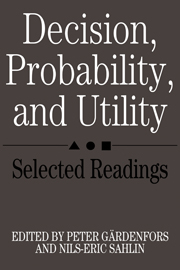Book contents
- Frontmatter
- Contents
- List of contributors
- Preface
- 1 Introduction: Bayesian decision theory – foundations and problems
- Part I Foundations of Bayesian decision theory
- Part II Conceptualization of probability and utility
- Part III Questionable rules of rationality
- Part IV Unreliable probabilities
- 13 Risk, ambiguity, and the Savage axioms
- 14 Self-knowledge, uncertainty, and choice
- 15 On indeterminate probabilities
- 16 Unreliable probabilities, risk taking, and decision making
- Part V Causal decision theory
- References
- Name index
- Subject index
16 - Unreliable probabilities, risk taking, and decision making
Published online by Cambridge University Press: 05 June 2012
- Frontmatter
- Contents
- List of contributors
- Preface
- 1 Introduction: Bayesian decision theory – foundations and problems
- Part I Foundations of Bayesian decision theory
- Part II Conceptualization of probability and utility
- Part III Questionable rules of rationality
- Part IV Unreliable probabilities
- 13 Risk, ambiguity, and the Savage axioms
- 14 Self-knowledge, uncertainty, and choice
- 15 On indeterminate probabilities
- 16 Unreliable probabilities, risk taking, and decision making
- Part V Causal decision theory
- References
- Name index
- Subject index
Summary
The limitations of strict Bayesianism
A central part of Bayesianism is the doctrine that the decision maker's knowledge in a given situation can be represented by a subjective probability measure defined over the possible states of the world. This measure can be used to determine the expected utility for the agent of the various alternatives open to him. The basic decision rule is then that the alternative which has the maximal expected utility should be chosen.
A fundamental assumption for this strict form of Bayesianism is that the decision maker's knowledge can be represented by a unique probability measure. The adherents of this assumption have produced a variety of arguments in favor of it, the most famous being the so-called Dutch book arguments. A consequence of the assumption, in connection with the rule of maximizing expected utility, is that in two decision situations which are identical with respect to the probabilities assigned to the relevant states and the utilities of the various outcomes the decisions should be the same.
It seems to us, however, that it is possible to find decision situations which are identical in all the respects relevant to the strict Bayesian, but which nevertheless motivate different decisions. As an example to illustrate this point, consider Miss Julie who is invited to bet on the outcome of three different tennis matches.
Information
- Type
- Chapter
- Information
- Decision, Probability and UtilitySelected Readings, pp. 313 - 334Publisher: Cambridge University PressPrint publication year: 1988
Accessibility standard: Unknown
Why this information is here
This section outlines the accessibility features of this content - including support for screen readers, full keyboard navigation and high-contrast display options. This may not be relevant for you.Accessibility Information
- 8
- Cited by
